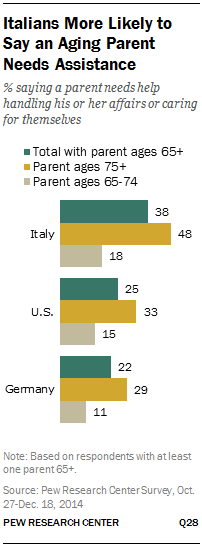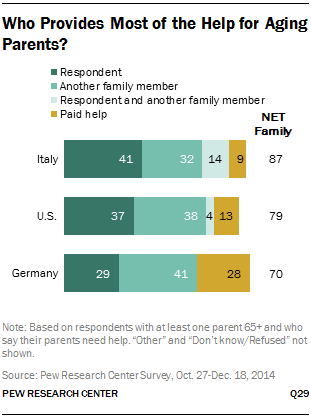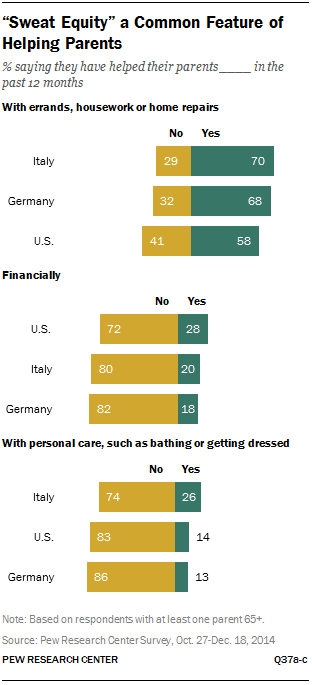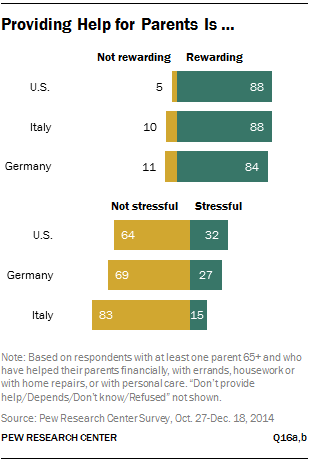
Most older adults in the U.S., Germany and Italy report that they are living independently and are satisfied with their lives. Still, many need support to deal with the challenges of getting older. The survey finds that in all three countries, families are taking the lead role as caregivers for aging adults who need help handling their affairs or caring for themselves. Among adults with an aging parent who needs assistance, solid majorities in all three countries say they or someone else in their family provides most of the care, with few, especially in the U.S. and Italy, saying their parents rely primarily on paid help.
Providing assistance to an aging parent can be stressful, especially for those who say the parent needs help handling his or her affairs or caring for themselves. But in the U.S., Germany and Italy, far more see this as a rewarding experience than as a stressful one.
In the three countries surveyed, majorities of adults with a living parent age 65 or older say they have helped the parent with errands, housework or home repairs in the 12 months prior to the survey. About three-in-ten or fewer say they have helped the parent financially or that they have provided personal care, such as bathing or getting dressed.
Who Needs Help and Who Provides It?

Most adults with at least one living parent age 65 or older in the U.S., Italy and Germany say their parents can handle their affairs and care for themselves, but some say their parents need help.
Italians are more likely than Americans and Germans to say an aging parent needs help. About four-in-ten Italians (38%) with at least one parent age 65 or older say their parents need help handling their affairs or caring for themselves, compared with 25% in the U.S. and 22% in Germany.
Not surprisingly, in all three countries, those with at least one parent age 75 or older are far more likely than those with parents ages 65 to 74 to say their parents need help handling their affairs or caring for themselves. Nearly half (48%) of Italians with parents in the older group say their parents need help, compared with 18% of those with parents age 65 to 74. Americans and Germans with a parent age 75 or older are also more than twice as likely as those with parents in the younger group to say the parent needs assistance (33% vs. 15% in the U.S. and 29% vs. 11% in Germany).
In the three countries surveyed, most of the assistance to aging parents who need help comes from family members. For example, in Italy, 41% of adults with a parent age 65 or older who say their parents need help report that they provide most of the care themselves; an additional 32% say other members of their family do, and 14% say they and another family member share this responsibility.
In the U.S., about as many say they provide most of the help to aging parents who need it as say someone else in their family does (37% and 38%, respectively). And in Germany, 29% of respondents say they provide most of the care, while 41% say someone else in their family does.
Relatively few in Italy and the U.S. say paid help is the main source of care for their parents; 9% of Italians and 13% of Americans say this is the case. A considerably higher share of Germans (28%) say their parents rely mostly on paid help.
Helping Aging Parents with Errands, Finances and Personal Care

Regardless of whether their parents need help handling their affairs or caring for themselves, most adults say they have helped their parents with errands, housework or home repairs. About seven-in-ten Italians (70%) and Germans (68%) with at least one parent age 65 or older say they have provided this type of help in the previous 12 months. A somewhat narrower majority of Americans (58%) also say they have done this.
In the U.S. and Italy, those with a parent age 75 or older are even more likely than those with a parent age 65 to 74 to say they have helped with errands, housework and home repairs. Three-quarters of Italians with aging parents say they have done this, compared with 61% of those with a parent age 65 to 74. In the U.S., 64% of those with a parent age 75 or older have provided this type of help, while about half (52%) of those with parents age 65 to 74 have done the same.
Fewer people say they have helped their parents financially or have provided personal care, such as bathing or getting dressed, in the previous 12 months. Nearly three-in-ten Americans (28%) and about one-in-five Italians (20%) and Germans (18%) with a parent 65 or older say they have provided financial help. In the U.S., those with incomes below the national median are considerably more likely than those with higher incomes to say they have done this (36% vs. 21%). A previous Pew Research survey showed a similar pattern with adults in lower-income households giving financial support to aging parents at higher rates than adults in higher-income households. There are no significant differences across income groups in Italy and Germany.
Many people who have provided financial help to aging parents in the preceding 12 months say the help was for special circumstances rather than for recurring expenses. More than half in Germany (53%) and the U.S. (48%) say this is the case, while 42% and 43%, respectively, say it was for a recurring expense. In Italy, however, more say the help was for recurring expenses (56%) than say it was for special circumstances (38%).
When it comes to helping an aging parent with personal care, about a quarter (26%) of Italians say they have done this in the preceding 12 months, nearly double the share of Americans (14%) and Germans (13%) who say the same.
In the U.S. and Germany, women are far more likely than men to have provided personal care to an aging parent. About one-in-five women with a parent age 65 or older in Germany (22%) and the U.S. (19%) say they have helped with personal care, such as bathing or getting dressed, in the previous 12 months, compared with just 4% of men in Germany and 8% in the U.S. Italian men are as likely as Italian women to have provided personal care to an aging parent (25% and 26%, respectively.
Helping Parents Largely Seen as Rewarding

Americans, Germans and Italians who are helping their aging parents financially, with errands, housework or home repairs, or with personal care are far more likely to say it is rewarding than they are to say it is stressful.
More than eight-in-ten in of those who are providing some help to a parent age 65 or older in the U.S. (88%), Italy (88%) and Germany (84%) find the experience to be rewarding, including 57%, 43% and 37%, respectively, who say it is very rewarding. In contrast, just about a third of Americans (32%), 27% of Germans, and even fewer Italians (15%) who are providing some assistance to an aging parent find this to be stressful.
Opinions about whether it is rewarding or stressful to provide help for an aging parent vary little by sex, income or age of parents. But adult children who say a parent needs help handling his or her affairs or caring for themselves – regardless of whether the adult child is providing any type of help – are far more likely than those who say their parents can do these things on their own to say caring for their parents is stressful.
More than half (53%) of Americans with at least one parent age 65 and older who requires some help say caring for their parents is stressful, compared with 20% of those whose parents can handle things on their own. In Germany, those with at least one parent who needs help are about twice as likely as those with parents who do not to find helping their parents to be stressful (42% vs. 20%). And while relatively few Italians in each group say it is stressful to help their parents, those who report that their parents need help are nearly four times as likely as those whose parents can handle things on their own to say it is stressful (23% vs. 6%).
For the most part, adults with aging parents in the three countries surveyed are comfortable with the amount of care and assistance they are providing for their parents. Large majorities – 78% in Italy, 74% in the U.S., and 66% in Germany – feel they are expected to do about the right amount for their parents. Just about one-in-ten or fewer feel that they are expected to do too much – 11% in Germany, 8% in the U.S. and 5% in Italy – while about as many feel that they are expected to do too little for their parents.
In the U.S. and Germany, women are more likely than men to feel that they are expected to do too much for their parents. About one-in-ten (11%) American women with a parent age 65 or older feel this way, compared with 4% of American men. Among Germans with an aging parent, 15% of women feel that they are expected to do too much, while just 6% of men do.




